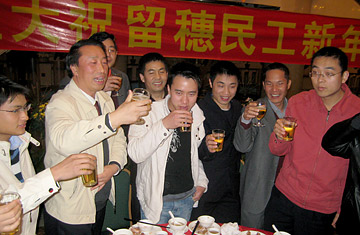
Migrant workers, despite not being able to go back home to visit their families, make a toast to celebrate the Chinese Lunar New Year.
"I feel great," says Zang Lifang. "People in Guangdong are very nice." Indeed, Zang's boss has just drained a glass of beer in honor of the 61-year-old construction foreman and a dozen of his workmates, and handed each man a red envelope containing a New Year's gift of $70 in cash — one third of a month's salary. Their dinner table is loaded with such tasty holiday treats as lotus root, fresh shrimp and carp, and the hall is festively bedecked with red and gold banners. But Zang's sunburnt skin and his Mao suit and Lenin hat look slightly out of place in this smart Guangzhou hotel with its marble-lined lobby. And despite the generosity of his employer, he confesses, he'd rather be elsewhere — eating a traditional reunion feast with his family in Shanghe county, then maybe watching the New Year's Eve gala broadcast on China Central Television. "I really wanted to make it home," says Zang, "but I couldn't this year."
Zang Lifang is hardly alone. Guangdong authorities say that more than 12 million of the province's 30 million migrant workers were forced to stay in the cities where they work because of the transportation chaos caused by some of the worst storms in a century. Last month, heavy snow and ice blocked major highways, toppled power lines, and hobbled rail traffic, leaving more than half a million homeward-bound migrants stranded outside the Guangzhou train station.
For millions of Chinese workers, the two-week Lunar New Year festival offers the year's only opportunity to visit their families. After some initial hesitation, the ruling Communist Party's leadership moved quickly to contain any anger sparked by travel chaos, launching a nationwide mobilization dubbed the "war on snow havoc." Premier Wen Jiabao made three trips in a week to areas hard hit by the storms, apologizing to stranded travelers, consoling families of workers killed clearing power lines, and visiting residents of towns that had been without power for more than 10 days. "This is very important, to allow Chinese people to have a good time at Chinese New Year," says Joseph Cheng, who heads the Contemporary China Research Project at City University of Hong Kong. Leaders who fail on that count, he says, "the people judge very harshly."
During his visit to the Guangzhou train station last week, Wen told the travelers that they "eat bitterness" — a Chinese expression for enduring hardship. That may be true even when they're not stranded by the snow. It has been the willingness of millions of migrant workers to suffer grueling hours at low pay that has turned this nation into an economic power. Lately, authorities have begun to realize they cannot take such sacrifice for granted. "Only in the last couple of years, as labor prices have begun to rise, have local authorities in Guangdong paid more attention to migrant workers," says Dali Yang, director of the East Asian Institute at the National University of Singapore. "Before they were treated as just another piece of equipment that was brought in when needed, because of the almost unlimited supply of labor." But despite the growing attention paid to the laborers in Guangdong, they are still outsiders. "Most migrant workers, they don't feel like they are truly welcome," Yang says. "As a result, during the holiday they rush back home instead of bringing their next of kin [to Guangdong] with them."
To ease pressure on the stricken transport system, Guangdong authorities encouraged migrant workers to spend their holiday in the province. Still, millions still tried to make the journey. For many, like Zang, that proved impossible. His employer, the Hengda Real Estate Group, says about 3,000 of the 10,000 migrants it employs in Guangdong stayed behind over the holiday. Li Xiao, the company's Guangdong general manager, says Hengda will spend $300,000 over the next week to offer banquets, parties and outings for its workers. "They have helped make us rich," Li says. "We have to look out for them."
Not all the workers had a grateful employer looking out for them, though. Some 260,000 people swarmed outside the Guangzhou station last weekend following a report that the northbound route had returned to service. Li Hongxia, an 18-year-old woman employed by a watch factory in the city had been heading for her village in Hubei province, when she fell and was trampled to death by the surging crowd.
In recent days, major road and rail lines have begun to reopen, and the crowds of travelers outside the Guangzhou station are a fraction of their previous size. Qi Huilin, 39, and his 19-year-old son, Chunjie, who had spent the past six months working in a shoe factory, stood outside Wednesday, holding tickets bought earlier in the day. "Before it was impossible," Huilin says. It will be another day before their train begins the 16-hour journey home to Henan. They'll eat their New Year's Eve dinner in the station, he says, then try to find a bed for the night.
